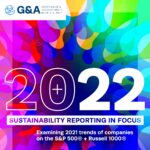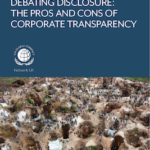The Centre for Human Ecologys Transparency Index is the first survey of environmental and social reporting in Scotland. It provides a snap shot of the performance of major companies in Scotland in an area that is increasingly important for competitiveness.
We wanted to find how well companies in Scotland are reporting on environmental and social issues. We examined annual reports and dedicated environmental and social reports. Recognising that many companies don’t produce dedicated reports we also looked at relevant policy documents produced by the companies that are in the public domain. This material was scored, using a CHE Transparency Index based on the Global Reporting Initiative’s Sustainability Reporting Guidelines.
Leading the way are power generators Scottish Power and Scottish & Southern Energy. The remaining high scorers (scoring 40 or over) are Abbey National subsidiaries Abbey National Life and Scottish Mutual, British Airports subsidiary Scottish Airports Ltd, British Energy, and AWG plc owned Morrison Ltd.
The second group (scoring 20 – 39) includes First Group, Bank of Scotland, Scottish & Newcastle, Stagecoach and the John Wood Group. It also includes subsidiaries of companies operating in Scotland – National Semiconducter, TotalFinaElf, Lloyds TSB Scotland, and Scottish Widows.
The third group (scoring less than 20) includes only two Scottish based subsidiaries: Keyline Builders, and Talisman Energy. The rest of the group are Scottish companies – British Polythene, Miller Group, Johnston Press, Robert Wiseman Dairies, Aggreko, and Scottish Media Group.
The CHE Transparency Index reveals that many major companies in Scotland are communicating about their environmental and social issues. Companies such as Scottish Power and Scottish & Southern Energy are setting a standard for others to follow. They produce substantive information about their environmental and social objectives, give details about how they work towards them, and make their future targets and performance public.
A high ranking in the CHE Transparency Index does not necessarily mean a high level of environmental or social performance – but it does show high quality reporting. Only a careful reading of those reports will give an indication of performance. Conversely, a low ranking, or indeed non-appearance in the CHE Transparency Index, does not imply that a company has poor performance in relation to environmental and social issues. A company may perform well, but choose not to report publicly.
The leading companies in the CHE Transparency Index are following an international trend. They join other major companies producing sophisticated environmental and social reports, companies like BP, Dupont, Electrolux, Ford, Proctor & Gamble, Shell, Toyota, TXU Europe, NEC Corporation, and Nike. They recognise not only that environmental and social performance is increasingly linked to their future success, but also the importance of communicating effectively with their stakeholders.
The top 10 of the CHE Transparency Index includes only three independent Scottish based companies: Scottish Power, Scottish & Southern Energy and British Energy. The other seven are subsidiaries of companies headquartered outside Scotland. Of the remaining 13 companies in the CHE Transparency Index, places 11 and below, all except three are independent Scottish companies – and several are major international companies. Many of these companies, although not scoring highly in the CHE Transparency Index, are well placed to improve their environmental and social reporting, or to start reporting for the first time.
Any major company which fails to report its environmental and social performance effectively, risks its reputation and competitiveness. The Industrial Society report Corporate Nirvana argues that a company’s ethical reputation is increasingly important in staff recruitment and retention. A MORI survey of 12,000 consumers in 12 European countries for Corporate Social Responsibility Europe, has shown that consumers want companies to be more responsible. They believe companies should pay more attention to the fair treatment of employees, respect of human rights, the environment, openness and honesty. The European Union green paper on Corporate Social Responsibility indicates companies will be expected to respond to the growing interest and concern about environmental and social issues. The CHE Transparency Index suggests that, at best, some Scottish companies are hiding their light under a bushel, or, at worst, are not aware of how fast the competitive landscape is changing.
Early adopters of environmental and social reporting across the world tend to be companies, such as Nike and Shell, with strong consumer brands and significant environmental or social impact. Companies from a range of sectors are now following suit. Their initial priority will be their own internal performance. Once that is in hand however, they will need to demonstrate that they are not merely transferring poor environmental or social practices elsewhere in the supply chain. Their supplier selection procedures will progressively incorporate environmental and social performance criteria. A number of the reports surveyed for the CHE Transparency Index demonstrate the growing importance of supplier auditing in these areas. Business partners that can provide evidence of environmental and social performance will be preferred. Scottish companies with robust environmental and social reporting in place will be at an advantage.
The approach to environmental and social reporting taken by the CHE Transparency Index is straightforward. A good report will set out the company’s policies and related objectives, and the targets it has set against its objectives. It will explain who is responsible and outline the procedures the company uses to achieve its objectives. It will state performance against these objectives and compare performance with previous years, and with its targets. There will be a clear link between reported performance and objectives. A good report will also include a statement from the Chief Executive which demonstrates commitment, highlights successes and failures, and discusses recent and future challenges facing the company in relation to environmental and social issues. This information can be in a dedicated report – equally it could be included in the annual report.
Many of the companies in the CHE Transparency Index scored highly in the ‘policy, support and procedures’ section, but were poor at reporting performance. Another common weakness was the ‘overview’ section – including the chief executive’s statement. These areas could readily be addressed to produce higher quality reports which provide a much clearer picture of the companies’ environmental and social performance.
The CHE Transparency Index reveals that many Scottish companies risk losing out through poor environmental and social reporting. Many have the potential however to build on their strengths to greatly improve the effectiveness of their reports, and enhance their reputations and competitiveness.



